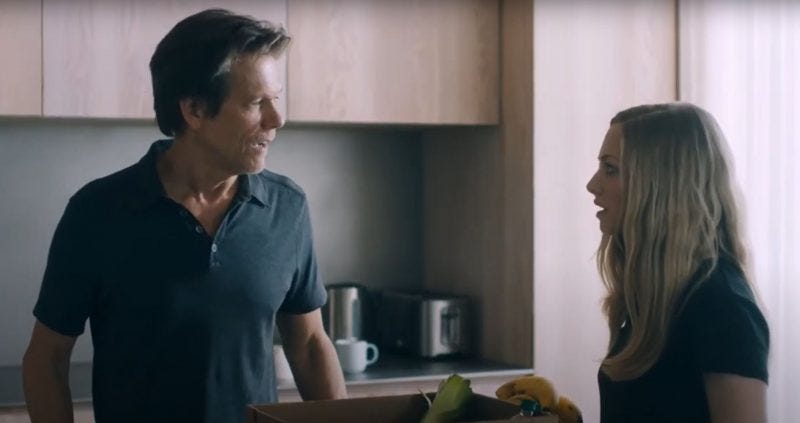You Should Have Left

It's always a pleasant surprise to be wrong about your negative first impressions of a movie.
Between the bland trailer, the shoddy poster, and the tenuous "from the producer of The Invisible Man" tag in the trailer, You Should Have Left certainly looked to me like a throwaway VOD release grasping at straws to garner the slightest bit of interest. The casting of an aging, iconic actor in the lead role seemed like a ploy to goad some poor Kevin Bacon diehards into watching. Even the opening minutes of the film screamed "B-movie dreck," and the hyper-crisp, digital, washed-out camera work only further complemented that notion.
And, admittedly, it's hard to argue that You Should Have Left doesn't show its limited budget. Small, simply-dressed sets and stock horror sound effects do their best to make this film feel cheap. But as the darkness of the story and the twisted psyche of Bacon's Theo Conroy become more apparent, the lo-fi-masquerading-as-hi-fi trappings begin to feel more coherent and deliberate; more stylistic than perfunctory. And though it never totally defies its low-budget nature, You Should Have Left manages to reach levels of emotional authenticity and rawness normally foreign to this "kind" of under-the-radar Universal Pictures movie.
Theo is a husband and a father, just trying to put his old life behind him and enjoy his new one with his wife and daughter. What is so worth "putting behind him" from his old life is not immediately clear, but it's obviously something he wishes would leave him alone. His wife, Susanna (Amanda Seyfried), is a young, sought-after film actress. Her close relationships with fellow cast and crew are often the object of jealousy for Theo, who seems to feel threatened by the clear age difference between the two.
Though their age gap is never stated explicitly, Theo is referred to as "old" a number of times by himself, his wife, and his daughter. Plus—just look at them. It's Kevin Bacon and Amanda Seyfried. Not exactly the same ballpark.
But this jealousy is something Theo is working on. He wants to trust his wife. He should. He needs to. But he needs just a hair of reassurance. So he suggests that he and Susanna take their daughter, Ella (Avery Essex) to Europe for a little getaway, just the three of them. Unwind and enjoy one another's company while Susanna is between productions.
Unfortunately, they picked the wrong house. A sprawling, postmodern abode in the Welsh countryside awaits them. Soon after settling in, Theo begins discovering strange inconsistencies in the house's design, and inexplicable signs left by who-knows-what. Walls aren't straight. Doors that were once a closet or a hallway sometimes lead to labyrinthine corridors beneath the house. Obscure and creepy polaroid photos appear, taped to the wall above the washing machine. Theo dismisses most of these as pieces of his nightmares, until they start recurring in the middle of the waking day. As Theo learns more and more about the house, it becomes clearer and clearer that something wants them to stay. Forever.
As if that wasn't mentally taxing enough, he still can't kick the notion that his wife is being unfaithful. So, Theo has a lot on his plate.
The story, and it's unfolding horrors, play out in a fairly conventional manner. Structurally, you're not seeing anything new here. And yet, it rarely feels trite or drab. Bacon and Seyfried do wonders with an uneven script that is, at its best, surprising, eccentric, and refreshingly natural, and at its worst, somewhat unconvincing and stiff. It's a strange and frustrating mix—perhaps the most inconsistent script in recent memory that still turned out to be good on the whole. Writer and director David Koepp is adapting a 2017 novella by German author Daniel Kehlmann; maybe something got lost in translation?
Nevertheless, it's ultimately a fairly satisfying script, particularly in its handling of Theo's and Susanna' relationship. Their arguments are simultaneously passive-aggressive and earnest; its clear, even when they both have an attitude with one another, that they do want to solve their problems. And when things finally come to a head between them near the film's final act, the "fight" is astonishingly level—more melancholy than angry. I'm not sure I've ever seen the "dramatic relationship troubles argument" done quite the way Koepp, Bacon, and Seyfried handle it here.
The "scares" here are probably the weakest element. You Should Have Left is at its best as a horror movie when its poorly-lit doorways and corridors lay agape, beckoning Theo to enter. When the film actually tries to make you jump is when it feels most like a B-movie. The reasons to watch this one are the themes of guilt and jealousy, and the way Koepp and crew execute the family drama.
Though it's a bit of a mixed bag of shlocky cheapness and excellent character work, You Should Have Left is still deeper and more poignant than it needed to be, enough so that I found Theo's arc, as well as the lead performances, emotionally gratifying enough to be worth the tepid horror bits. And it's clear Bacon still has plenty to give; he's no tacked-on selling point, but rather a vital part of the film's dramatic power. Much like Theo says about himself, he's "not THAT old."
https://www.youtube.com/watch?v=Bw0-cV_J9q4&w=585



